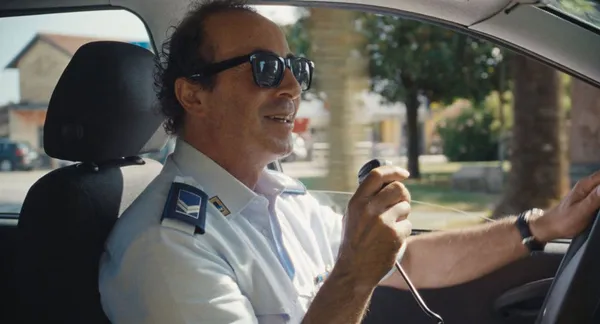 |
| The Adventures Of Gigi The Law (Gigi La Legge) director on Pier Luigi Mecchia as Gigi and Jacques Lacan: “Sometimes he can laugh with people - it’s his way to have a relationship with the Other …” |
Gigi (Pier Luigi Mecchia), in Alessandro Comodin’s charmingly absurd and delightfully real The Adventures Of Gigi The Law (Gigi La Legge), works for the local police in a rural corner of the Friuli region in the northeastern part of Italy. He has a contentious debate at night with his neighbour (Ezio Massarutto), who wants Gigi to cut down some of the trees and shrubs in his jungle-like garden, as they presumably attract “rats and snakes.” This insinuation infuriates our otherwise mellow and cheerful hero.
 |
| Alessandro Comodin with Anne-Katrin Titze: “You don’t have to make a big show to tell a story as mythological as Ulysses, the Odyssey. |
The daily routine (shot by Tristan Bordmann) for Gigi of driving around with colleagues (Mario Pizzolitto, Annalisa Ferrari, Rebecca Martin, who sings Nada’s Amore Disperato with Gigi) and solo through the calm countryside to check for things that might be wrong - say a fire or grass to be cut - is enlivened by the arrival of a new colleague, Paola, a dispatcher whom Gigi meets first on his patrol car radio. Intrigued by her voice alone we can see his imagination take flight, simply by looking at his revealing face.
The flirtation continues to be both ingenuous and mysterious. There is a dead person by the railroad tracks and a hunch. A man with 12 cats is putting out his laundry to dry. Road workers take a break to have a chat with Gigi. Chamomile scent, palm trees, chickens, grandmothers on bicycles and the dramatic alteration of light before a thunderstorm - we get a peek into Gigi’s world, which is one about to disappear, not only here, but all over the globe, precisely because we thought it would last forever.
Very grave, traumatic, and fragmented accounts concerning a mental institution and possible betrayal, and the lightest laughter while on patrol singing along with a fellow officer (Massimo Piazza) to the Julio Iglesias song about being a pirate and a gentleman (Sono Un Pirata, Sono Un Signore) find room in this captivating motion picture. The melodic Friuli dialect casts a spell and the punctiliousness of the editing (by João Nicolau) keeps us guessing at the many secrets right outside the frame.
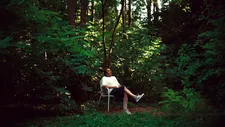 |
| Gigi in his garden |
From Paris, Alessandro Comodin joined me on Zoom for an-depth conversation on The Adventures of Gigi the Law, a highlight in the Currents programme of the 60th New York Film Festival.
Anne-Katrin Titze: Hi!
Alessandro Comodin: Hi, nice to meet you!
AKT: How is Gigi?
AC: He’s okay. We met in Milan on Saturday because we had a screening over there and it was very nice. He was very happy to go out from his village and to have a good reason.
AKT: He is such a fantastic leading man! When did you know that your uncle could be the star of a film of yours?
AC: Until the end I was not sure if it was a good idea. You know, I don’t make films very often because funding and everything takes quite long and also because I’m very slow in my way of working. So I’m not used to make my job very often. Sometimes you can lose the faith in reality and your way of filming. Before shooting the film I was not sure that it was a good idea, but in the end I realised that yes, it was very nice and we had a lot of fun.
AKT: I love the start with the garden and the sounds. A dog, crickets, chickens, more dogs, and then the conversation about the garden, which later on returns. It feels as though the conversation about the “jungle” had been going on for centuries almost. Tell me about the decision to start that way!
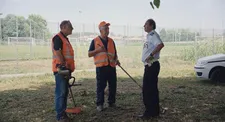 |
| Gigi gossips with road workers Renato Glerean and Claudio Bornanci |
AC: It was a decision during the editing. This particular scene I shot in 2018. When you need money, you have to film a little bit to show people what kind of film it’s going to be. I tried to film this conflict scene because it’s true, he has a lot of problems with is neighbours, especially with one, who is his cousin, my cousin too. It’s a very hard, very violent conflict, but at the same time I don’t think it’s going to finish one day, that conflict, because we are the product of the story, of the history. They don’t know what they are talking about. Of course trees are in-between but they don’t know what they are talking about; they are just in conflict.
AKT: It’s love thy neighbour, but not really. Also in his duties, there is a search for conflict. A search for mystery, for being Philip Marlowe. There’s a desire to be a real detective.
AC: Yes, I think it happens to everybody, I guess, but for him it’s exaggerated. He desires a reality and he tries to make reality conform to his desire. Of course cinema is also that.
AKT: So it runs in the family!
AC: Yes, ha, it runs in the family. But it is for good. He imagines that the others are good sometimes, but at other times he imagines that the Other, with a big O, is bad. Sometimes his garden is a good garden, sometimes it’s a bad garden with all the people inside. Sometimes he can laugh with people - it’s his way to have a relationship with the Other, to laugh. Sometimes when the other doesn’t answer with laughter, he is an enemy. It depends, the world is how h feels the world. It’s a very poetic way to tell something about our relation with the Other.
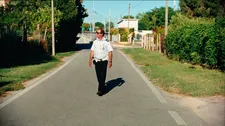 |
| Gigi on the lookout |
AKT: With the big Lacanian Other.
AC: Yes!
AKT: It’s so fascinating that the film for me felt partly like the small town where my grandparents lived, combined with a David Lynch movie. Your film captures something that made me think that maybe they are one and the same and that this is the world we live in. The quotidian small town world at the same time is much more. For example, the boy he encounters is named Ulisse. It’s so wonderful because suddenly there is Ulysses in there and Gigi helps him return home because he had failed his exams. Suddenly mythology enters the picture in the most natural way.
AC: I can only tell the reality that I know. I come from that village in particular, so if you are very attentive in a small reality, you can find all the mythology you can find in books. You don’t have to make a big show to tell a story as mythological as Ulysses, The Odyssey. Homer or all the persons who composed that story, they composed that story watching the reality. And the reality is made of stones, people, and little things.
AKT: Absolutely. The jungle in my backyard can become the heart of darkness. I liked your choice of structuring devices, for example the sound of driving over the bridge, which happens twice. And of course the wonderful dispatcher calls. And everyone, even if they don’t speak the language, will now know “passo.” The rhythm is great.
AC: Yes, I like to make stories with very few elements, few characters and try to construct a film with all these little elements. And they are very concrete, very real. They are a tree, of course, a bridge and its sounds and the little rituals of the day. The rituals of this little policeman lost in the countryside. It is nice to create a story, a film with these very banal elements of reality. I like to make it with the real people, there’s no professional actors. I think they are very good, they play very well.
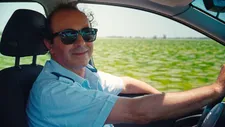 |
| Alessandro Comodin on Gigi: “I told him in the film it’s a moment to be free and he likes to play and he likes to laugh.” |
AKT: They do. And the mystery around Paola is great because there are different descriptions and a lot of suspense surrounding her. By the way, your trailer is fantastic, it completely got me hooked to see this film.
AC: We decided to work with this girl in particular. She is the only character who is not from the reality of the village. She is the only “actress” if you want, of the film. She’s not an actress, she’s a midwife. In life her name is Ester. She’s a mystery to me and when decided to work with her, I had to work with her schedule. I never filmed her; I didn’t do classical casting. I just asked her to drive the car and I filmed her a little bit in the car.
I loved the relationship she had with my uncle Gigi. I had to compose the shoot with her hospital schedule in mind. She told us she would have a week of holidays. Before we only had one day a week to work with her. I wanted to prepare her to the film, and as I know that Gigi loves to talk on the telephone, I invented this relationship. I didn’t write anything.
AKT: You told him about it?
AC: Every week we had one day with Ester and they had to talk about something. So the first day was the very first meeting. It was like a game to construct. For me it was like a preparation and rehearsal, but in the end it is the film.
AKT: It’s lovely when they talk about preparing for their date, during which they intend to have two butterflies, a gust of wind, a violet, a daisy, and a rose. It is like children planning a picnic with their stuffed toys. It’s so poetic and not really a date and I’m not giving anything more away - the mystery should remain intact. Did they come up with these elements?
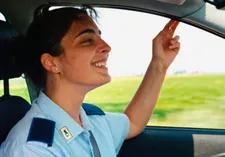 |
| Rebecca sings with Gigi Nada’s Amore Disperato |
AC: They just invented it. They talked about a lot of things while they are on the radio. I was in the car with Gigi and I gave him a cigarette and told him to stop close to the railway and to talk with Paola. And he invented this date, this invitation. It was very nice, it’s real and at the same time like a child. It’s always in between the reality and what you desire for the reality.
AKT: It’s something we are told to lose growing up. You’re not supposed to do that as an adult. The playfulness is discouraged and is maybe allowed in art.
AC: I told my uncle to try to be free. For the first time. You know, it was his job, he got fired. He was a policeman for 25 years and in the end they told him for some reasons that he’s not going to be a policeman anymore. It was very hard for him because he likes his job very much.
The contact with all the people, to help people, not to be a policeman who is bad to make people respect the law. He’s a human policeman. Nowadays it’s not possible. I told him in the film it’s a moment to be free and he likes to play and he likes to laugh. He was happy to discover, which he told me the first time he watched the film, that for the first time in his life he realised that he was good-looking.
AKT: Yes, a pirate and a gentleman, as Julio Iglesias sings in the film. That’s who he is. AC: Yes, you know he is from a generation before mine. In Italy, my parents are from the Fifties, and in the Fifties people were very poor. Ten years later we had the economic boom and baby boom and everything, so they discovered the comfort a little bit.
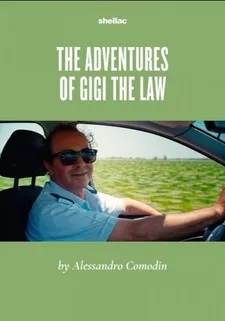 |
| The Adventures Of Gigi The Law poster |
He is of a generation between the ancient rural people and a future of being able to eat a lot and listen to music, and have a lot of gadgets of the modern world. So he is still ancient in a way. Also in relation with women he is an ancient romantic man that doesn’t exist anymore. We are being told this kind of romanticism is from the past and no good, but sometimes his way of being romantic is very nice.
AKT: Very charming.
AC: Very charming. I think it’s an homage to the men like him.
AKT: One more point about the tone and the sounds. The Friuli accent sounds like a samba. It’s so rare to hear that in cinema.
AC: Yes, especially in Italian movies. I studied cinema in Belgium and France. I have a big problem with Italian movies in general, especially because of sound and how Italian movies in general treat the voices. It’s a television world, Italian cinema comes from the television and they try to play an average accent. Even when they try to put dialect inside, they put it in an exotic way. They don’t treat dialect as the way people talk every day. They are inventing artificial dialects.
AKT: That’s like the mid-Atlantic accent in classic Hollywood movies of the Thirties and Forties, where American actors had to sound more British or continental. That’s interesting.
AC: Yes, it’s very interesting. There is a big school of dubbing in Italy. Even in Italian they dub themselves. As I studied abroad in France and Belgium, I discovered the sound abroad. I like direct sound. What I love in Italy are all the different accents. They are not very pure, they mix everything together and of course sometimes in the translation you cannot give all the social meanings of employing different dialects together, but you can feel it.
If you can feel it in a musical way it’s nice. Before the subject, I feel the music in the way the people talk. I love to do that, but it’s like a revolution in Italy. I didn’t do anything special, I just recorded the reality as it is.
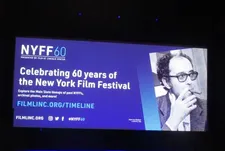 |
| Celebrating 60 years of the New York Film Festival honouring Jean-Luc Godard Photo: Anne-Katrin Titze |
AKT: It sounds great and you made a beautiful film.
AC: Thank you!
AKT: Wishing you toi, toi, toi with your screening at the New York Film Festival!
AC: Thank you very much and have a nice day!
The Adventures Of Gigi The Law will screen at the New York Film Festival on Wednesday, October 12 at 9:15pm - Francesca Beale Theater; Thursday, October 13 at 6:15pm - Howard Gilman Theater. Alessandro Comodin will participate in Q&As on both days.
The 2022 New York Film Festival runs through October 16.





















